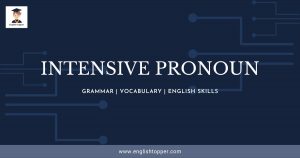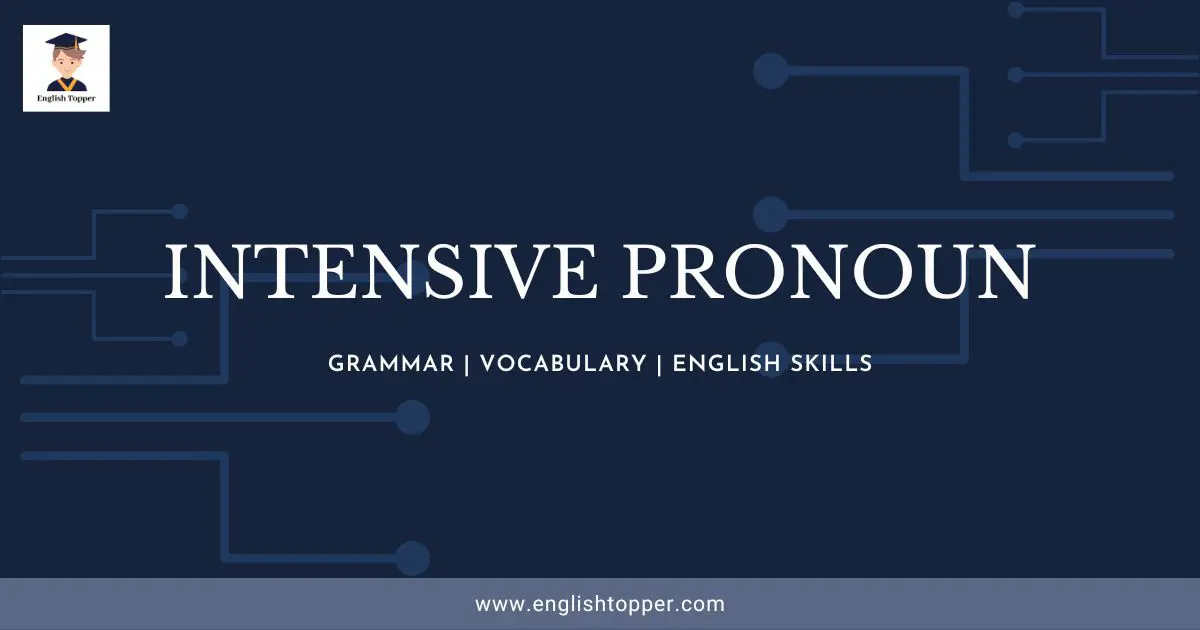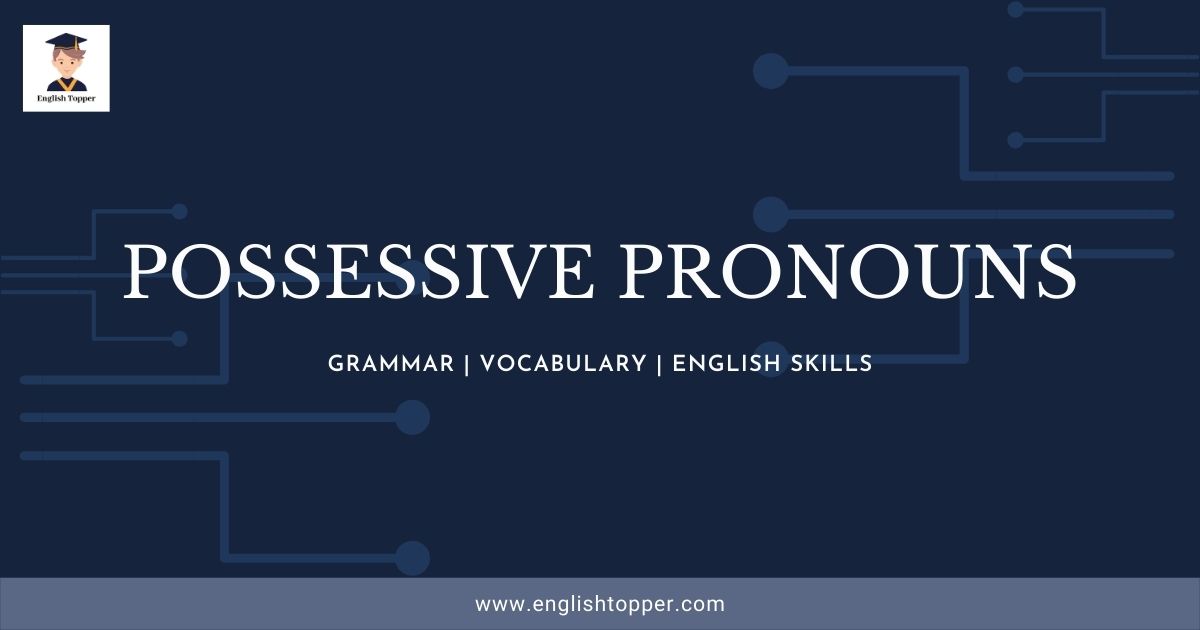Table of Contents
Intensive Pronoun Definition and Examples
An Intensive Pronoun is a type of pronoun that is used to give importance (emphasis) to the subject or antecedent in the sentence. In other words, it is also defined as the pronoun that ends with “-self” or “-selves” and places emphasis on its antecedent in the sentence.
This type of pronoun is mostly used right after the noun or pronoun it’s modifying (but not necessarily). Sometimes it is also called “Emphatic” because it places emphasis on its antecedent by referring back to another noun or pronoun used earlier in the sentence.
This concept is quite similar to that of the Reflexive pronoun, but both functionalities differ from each other. (We will learn the main difference in the latter part of this article).
For now, to understand this concept well, let us consider an example.
Example Sentence 1: He himself doesn’t have the confidence to crack the exam.
Let us understand the sentence structure based on the Parts of Speech.
Sentence Structure: He (Subject) + himself (Intensive Pronoun) + doesn’t have (Verb) + the confidence to crack the exam (Object).
From the above sentence, we can observe that the Intensive pronoun is used right after the Subject.
Example Sentence 2: She herself made a big decision in her life.
Sentence Structure: She (Subject) + herself (Intensive Pronoun) + made (Verb) + a big decision in her life (Object).
If you haven’t read about Reflexive Pronoun, you can click here to read.
Related Topic: Reflexive Pronoun (Easy Definition & Examples 2022)
Intensive Pronouns List
Consider the table below that shows the list of all Intensive Pronouns.
S/P Form | Intensive Pronoun |
Singular | myself |
Singular | yourself |
Singular | himself |
Singular | herself |
Singular | itself |
Plural | ourselves |
Plural | yourselves |
Plural | themselves |
Singular Intensive Pronouns
An Intensive Pronoun is said to be singular when it refers to only one person. Singular intensive pronouns include,
- myself
- yourself
- herself
- himself
- itself
Plural Intensive Pronouns
An Intensive Pronoun is said to be plural when it refers to more than one person or thing. Plural intensive pronouns include,
- ourselves
- yourselves
- themselves
More Intensive Pronoun Example Sentences
Here are a few examples of Intensive Pronoun in sentence form which helps in better understanding of the concept.
- I myself made this toy for the first time.
- You yourself alone witnessed the theft that happened last night.
- Raju himself was aware that the meeting has been cancelled due to a specific reason.
- She herself learned to cook without the help of anyone.
- The evidence itself proves that the person is guilty.
- We ourselves can make some profits.
- They themselves started laughing when someone cracked a joke.
Intensive Pronoun vs Reflexive Pronoun (What’s the main difference?)
Now, let us understand the main difference between the Intensive Pronoun and Reflexive Pronoun with an example.
Example 1:
- Sentence 1: Don’t you put yourself at risk?
- Sentence 2: You yourself took the risk.
Both of the sentences have the same subject (You) and the pronoun (yourself), now, let us understand the functionality that makes both of the pronouns different. Let us check the structures of both sentences.
- Sentence Structure 1: Don’t you (Subject) + put (Verb) + yourself (Reflexive Pronoun) + at risk (Object)?
- Sentence Structure 2: You (Subject) + yourself (Intensive Pronoun) + took (Verb) + the risk (Object).
In the first sentence, if we try to remove the pronoun “yourself”, then the sentence will become,
Sentence: Don’t you put at risk? (which doesn’t make any proper sense or meaning)
But, in the second sentence, if we try to remove the same pronoun (yourself), then the sentence would become,
Sentence: You took the risk. (which is correct and makes some meaning)
So, here we can conclude that the pronoun that makes some sense even if it is being removed from the sentence is called an Intensive Pronoun, whereas the pronoun which doesn’t make sense when it is removed from the sentence is called a Reflexive Pronoun.
Thus, we can clearly say that the first sentence contains a Reflexive Pronoun and the second sentence contains an Intensive Pronoun.
Example 2:
Now let us consider another example which contains a similar meaning.
- Sentence 1: The boy bought himself a candy.
- Sentence 2: The boy bought the candy himself.
- Sentence Structure 1: The boy (S) + bought (V) + himself (RP) + a candy (O).
- Sentence Structure 2: The boy (S) + bought (V) + the candy (O) + himself (IP).
Here, if we try to remove the pronoun “himself” from the first sentence, then it doesn’t convey any meaning. It is unclear whether the boy bought the candy for himself or for the others? But, in the case of the second sentence, we can get the meaning even if we remove the pronoun.
Quiz Time!
#1. I build this house for _______. Choose an appropriate pronoun.
#2. "You yourself can't handle the situation alone". Choose the appropriate pronoun used.
Answer: Intensive Pronoun
Explanation: You yourself can’t handle the situation alone.
If we try to remove the pronoun, then the sentence doesn’t change its meaning. So, it is an Intensive Pronoun.
#3. The mouse _______ opened the door to the cage.
#4. The sentence with Intensive Pronoun does change with its removal. Is it true or false?
Answer: False
Explanation: The sentence with Intensive Pronoun does not change with its removal.
#5. "We gave ourselves plenty of extra time". Which type of pronoun is used in the sentence?
Answer: Intensive Pronoun
Explanation: We gave ourselves plenty of extra time.
The meaning of the sentence doesn’t change with the removal of the pronoun.
#6. "Andrew decided to treat himself to a fancy lunch". Which type of sentence is this?
Answer: Reflexive Pronoun.
Explanation: The sentence uses the pronoun, which refers back to the subject, and the removal of it doesn’t make a proper meaning.
#7. Intensive Pronouns are not essential to the meaning of the sentence. True or False?
Answer: True
Explanation: Removal of these types of pronouns doesn’t affect the actual meaning of the sentence.
#8. Intensive Pronoun uses _______ and ________. Choose the correct option from below.
#9. Which of the following is not an Intensive Pronoun?
Answer: hisself
Explanation: The actual answer is “himself”.
#10. "The boy himself broke his scale". The sentence contains ________.
Results
|
Getting your Trinity Audio player ready...
|
Hurray….. You have passed this test! 🙂
Congratulations on completing the quiz. We are happy that you have understood this topic very well.
If you want to try again, you can start this quiz by refreshing the page.
Otherwise, you can visit the next topic 🙂
|
Getting your Trinity Audio player ready...
|
Oh, sorry about that. You didn’t pass this test! 🙁
Please read the topic carefully and try again.
Summary

Here is the summary of the topic of what we have learnt till now.
- An Intensive Pronoun is a type of pronoun which emphasizes the subject’s or antecedent’s verb. This type of pronoun works similar to the Reflexive pronoun, but the functionality differs.
- The difference lies in the meaning of the sentence when the pronoun is being removed.
- Examples of Intensive Pronouns are himself, herself, ourselves, etc.
- When an Intensive Pronoun refers only to a person, then it is called a Singular Intensive Pronoun.
- Whereas if an Intensive Pronoun refers to more than a person or group, then it is called a Plural Intensive Pronoun.
If you are interested to learn more, then you can refer to Wikipedia here.
I hope that you understood the topic well. If you still have any doubts, then comment down below, and I will respond as soon as possible. Thank you 🙂







